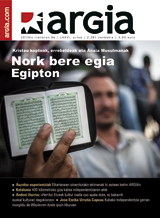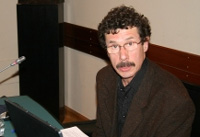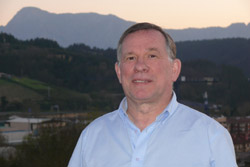Basque of birth, French as it is, European of dream
- In 1986, in an interview in Argia, Josu Landa presented Haritschelhar: “Entering the affairs of Ipar Euskal Herria, the name of Haritxelhar always comes from somewhere. It is, above all, an indispensable reference in the world of culture”. For the district of Baigorri, professor of Basque Language and Literature at the University of Bordeaux, president of the Basque Museum of Baiona and president of Euskaltzaindia between 1989 and 2004. Born in Baigorri (Lower Navarra) in 1923, he died at the age of 90 on 1 September.

In the following lines we collect excerpts from some of the interviews conducted in the weekly Argia in Haritschelhar.
Olite, 09-11-1975-1976
Errialde asks what kind of Ipar Euskal Herria wants, if beautiful, but without work, or with some industrial smoke: “Smoke accuses life because there is no smoke without fire. It's the same for industry. A little smoke could produce life for us. We also need to have a clean industry and clean workshops in Ipar Euskal Herria, so that our young people are in the mountain villages.”
Josu Landa, 19-10-1986
“The French Government has the fear that it does not have with Breton of the Basques, yes, and especially with the autonomous community of the Basque Country, with the South.
Suppose it's the issue of refugees, of fishing -- and it's there. In general, the struggles between Spain and France have been through the Basques; and I believe that the French government sees nothing else. That is what the ostrich policy is doing.”
Joxan Oiz, 08-01-1989
The journalist asks who he would be in politics with: With the EMA, the EU, the EA, the ‘Ager’ environment -- “I’ve always been independent, I want to retain my freedom because I know you step into a party and lose your freedom.
It still gives me what others think, I follow my path and my work, and I think I've done something about that work. I also believe that there is an interruption of this kind: either Abertzale or Spanish, is that always true? It takes a little bit of sensitivity. That’s being partisan, and I don’t like being partisan.”
Asking about the tension between the batua and the dialects: “I don’t think there is such a fight, I think there are some who believe it. I could not use Euskera batua, I could use Euskera batua because the unified Euskera is not yet done, there are some proposals. The Royal Academy of the Basque Language has never rejected the dialects, it is based on that, and if some say, and have said, that Euskaltzaindia was against the Basque dialects: I say they lie. We have to see for whom we write: if we want to be read in its entirety, then towards unity, always gently. Because what he said in the dessert is that you do not play with a language and each one has his own role in his dialect, euskaldunifying and reading. What you have to see is that you always have to get in touch, it's very silly to understand us. If franquophonia is accepted, why do we not accept Euskorotony? Euskera is a language, but those dialects we know are not languages.”
Reflection on bilingualism and monolingualism: “Once in a speech on bilingualism, I said: On Oraiko's day, the man or woman who dominates only one language is very poor and pilgrim. Bilingualism is necessary. I think that in Euskalerria we have to own 3 languages, and in that first the Basque language, then the second, I share, the Spanish or the French language. I know them all three, and I love Spanish (Cervantes, Lope,...), and I love French (Moliére, Comeille,...). All those who live in the Basque Country must be singled out. Utopia? Maybe, but in a low voice ... I propose bilingualism, not dyglossia. The Basque country has to give it a boost, because it is necessary, the law is not enough, that is, that this law is complied with. How do you fill it up? It's Euskaldunes first filling. If the store doesn't know Euskera? well, but before the administration: He receives a ‘I don’t know’, so he asks one to ‘bring’. That’s everyday work.”
Jojo Bidart, 1995-IV-30
Asked if he will continue to write in the weekly Herria with the nickname of Gexan Pontto: “No doubt. I continue in the newspaper ‘Herria’, using humor and maintaining this phrase: ‘I have black ancreas, but I don’t numb anyone; I have feathers, but I don’t hurt anyone.’
Jean Haritschelhar idazle, politikari eta euskaltzainburu ohia (Baigorri, 1923) hil da Miarritzeko erietxean, 90 urte zituela. Hil kapera Baionako beilatokian jarri dute, eta hileta asteazkenean egingo da Baigorrin.
Hainbat erreakzio izaten ari da Jean Haritschelhar baigorriarraren heriotza. Euskararen eta euskal kutluraren inguruko pertsonen eta politikarien hitzak zabaltzen ari dira.















